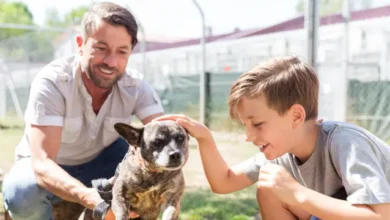Natural Remedies for Dogs Upset Stomach

MixbreedDogs.com is an Amazon Associate, and we earn from qualifying purchases.
Dealing with an upset stomach is never pleasant, whether it’s for you or your furry friend. While reaching for ginger ale might be your go-to solution, when your dog is experiencing digestive distress, the approach is a bit different. Understanding the causes and recognizing the symptoms of an upset stomach in dogs is crucial for their well-being. In this article, we’ll delve into the reasons behind canine stomach issues and explore natural remedies to help your pup feel better. Because when your four-legged companion isn’t feeling their best, a little know-how can go a long way in providing comfort and relief.
Common Causes of Upset Stomach in Dogs
When it comes to upset stomachs in dogs, the causes can be as varied as their curious nature. Dr. Kathy Backus from Holistic Veterinary Services in Kaysville, Utah, points out that a common culprit is their penchant for exploring the world through their mouths. Dogs, much like kids, have a tendency to ingest things they shouldn’t, leading to the body’s protective response of vomiting and diarrhea to expel the unwanted substances. This natural defense mechanism is entirely normal in a healthy dog. However, there are other triggers for canine digestive upset, including bacterial imbalances within the digestive tract. These imbalances can disrupt the delicate ecosystem of the gut, causing discomfort for your furry friend. Additionally, chronic conditions such as food sensitivities can contribute to ongoing digestive issues. Understanding these diverse factors can help dog owners identify the root causes of their pet’s upset stomach and take appropriate steps for their well-being.
Read More: Beagle Pitbull Mix – Is This Cross Right for You?
Symptoms of Upset Stomach in Dogs
When your dog is grappling with an upset stomach, being attuned to the signs is essential for prompt care. The most common indicators, as highlighted by Jody Bearman, DVM at Anshen Veterinary Acupuncture in Madison, Wisconsin, are vomiting and diarrhea. Keep a watchful eye on other potential symptoms, including a waning appetite, increased fatigue, reduced water consumption, signs of distress or depression, and unusual stretching movements that mimic a downward dog pose. Additional behaviors like gulping to combat reflux and persistent licking of lips, the air, or objects can also signal digestive discomfort in your canine companion.
Symptoms of Upset Stomach in Dogs:
- Decreased appetite or loss of appetite
- Fatigue
- Drinking less water
- Seeming depressed
- Looking uncomfortable and stretching more often (like they are attempting a downward dog)
- Gulping to combat reflux
- Licking their lips, the air, or objects
When to Call the Vet
Keeping a close eye on your dog’s well-being is crucial, especially when dealing with an upset stomach. If your pup’s discomfort persists or worsens, it’s essential to reach out to your veterinarian for guidance. Be attentive to specific signs that may indicate a more serious issue, such as increasing discomfort, persistent vomiting or frequent episodes of diarrhea (more than twice), the presence of blood in vomit or stool, or the emergence of foreign objects in these excretions. Additionally, watch out for signs of weakness or collapse, as these could be indicative of severe conditions like pancreatitis, stomach bloating, allergic reactions, or internal parasites. If you suspect your dog has ingested something harmful, seeking immediate veterinary care is paramount. In case your regular vet is unavailable, contact your local emergency veterinary hospital for advice on whether your pet should be seen or monitored at home. For poison-related concerns, the ASPCA Animal Poison Control hotline at 888-426-4435 can provide assistance, including assessing toxicity levels and recommending appropriate care for your dog.
When to Call Your Vet:
- Increasing discomfort
- Vomiting or having an episode of diarrhea more than twice
- Blood in vomit or stool
- Toy or other foreign object in vomit or stool
- Weakness or collapse
Remedies for Upset Stomach in Dogs
Home Remedies For Dogs Upset Stomach
Consulting your pet if you think it is necessary is always a good idea, but in case you wanted to try something else, or believe your dog to not be in too much discomfort you may want to try one of the following:
Wait
That’s right sometimes all you can do is sit tight and let your dog’s body deal with whatever is making it ill. They are pretty robust beings and you might find that not feeding them for half a day or even a full day will give them a chance to flush out what is worrying them.
Ice Cubes
Removing their water bowl is a good idea as too much fluid can make the problem worse.
Giving them ice cubes helps you to limit their intake and distracts them for a few moments whilst they crunch on the ice.
If they are ok after a few and you have left it a while, give them some more to keep them hydrated.
Rice
Try making an almost rice broth type dish to settle your pet’s stomach. Boil rice and drain and keep the water, feeding this to them once it has cooled down a little. The simple mixture of rice flavored water will keep them going.
Canned Pumpkin
It might be a good idea to keep some of this handy in the food cupboard just in case you need it. It is absorbed slowly and therefore is ideal for an upset stomach. Don’t give them any more than one spoonful of a medium to large dog, and less than that for smaller breeds.
Whatever it takes we hope your furry friend feels better in no time.
Conclusion:
So, if your furry friend is feeling a little off, try one of these natural remedies for an upset stomach. And as always, consult with your veterinarian before starting any new treatment plan. Thanks for reading
Related Posts:



